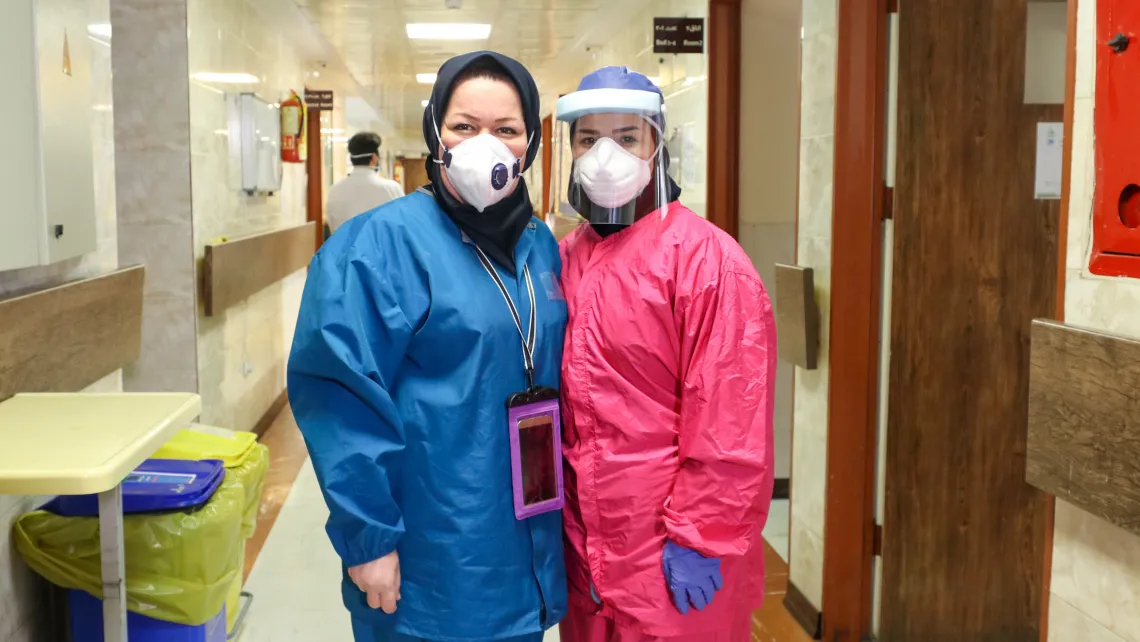Between Fear, Courage and Hope
"What I feared the most was that my husband would get infected with COVID-19, and [that] unfortunately [was what] happened. [He] was a nurse [in] the hospital’s Emergency Ward, and he contracted COVID-19," says Mohaddeseh Rezazadeh, a young nurse attending to COVID-19 patients at Tehran’s Sina Hospital. "We had to put him in isolation for 14 days and I was so worried about his worsening health condition all this time," she adds. "What kept me hopeful throughout these days, was seeing COVID-19 patients hospitalized in our ward getting discharged in complete health."
Iran is one of the countries that has been most severely affected by COVID-19. Official figures indicate that as of mid-May 2020, there were more than 118,000 active cases and almost 7,000 had died.
Among others, Iran’s health workers have borne the heaviest burden. According to state media, 15,000 medical staff and 100,000 nurses have been active in the fight against COVID-19 and unfortunately a number of them have lost their lives in this battle. Since the start of the outbreak, UNICEF has been supporting protection of Iran’s health personnel against COVID-19 through provision of Personal Protective Equipment (PPE) items - such as surgical masks, gloves, coveralls, shields, aprons and goggles. Sina Hospital, which is located in the heart of Tehran and is currently serving as a COVID-19 treatment centre - mostly for economically vulnerable citizens - has also received the UNICEF supported PPE items.
Mohaddeseh says that having access to PPE is reassuring and heartwarming for her and her colleagues at Sina Hospital. "When I wear a shield or a mask and go to the bedside of patients, I worry much less if the patient coughs. Though you can never be absolutely sure, but it still feels reassuring. Or, when I wear the coveralls, it makes it less likely that the droplets from patients stick to my clothes or I carry them out of the ward."

To date, in response to the request from the Ministry of Health and Medical Education, UNICEF has flown into the country a total of 63 metric tons of PPE items, which were distributed among hospitals admitting COVID-19 patients, under medical universities in the provinces of Gilan, Isfahan, Khouzestan, North Khorasan, Sistan and Balouchistan, East Azerbaijan, West Azerbaijan, Qom, Hamedan, Tehran and Alborz.
Fariba Hajimohammadi, a head nurse with over 20 years of experience currently working at Tehran’s Sina Hospital, speaks of her conflicting emotions when attending to Covid-19 patients. "When I step into the ward early in the morning, I feel stressed and worried, but as I enter and look into the eyes of the patients who need me and consider me as someone who can bring them hope, then my worries disappear. At the end of my shift when I leave the ward, I feel so blessed that I was able to do something for them," she says.
Fariba says her family has supported her all the way through and helped her reduce stress. "But what really helps us to reduce our stress at work is having access to PPE. The mask, shield, gloves and the coverall I wear, all help me to care for Covid-19 patients with peace of mind."
Apart from PPE, UNICEF Iran is also providing assistance to government organizations, based on their request, to meet the urgent health needs of vulnerable children including children at nurseries, children living with disability as well as children living in less advantaged areas.
Fariba and Mohaddeseh shared one thing in common as they described their feelings of seeing recovered patients: the sparkle in their eyes and the joy in their voices.
"You don’t know what a great feeling it is to see someone who needed oxygen mask to breathe a while ago, has now fully recovered and can walk back home on their own feet."
